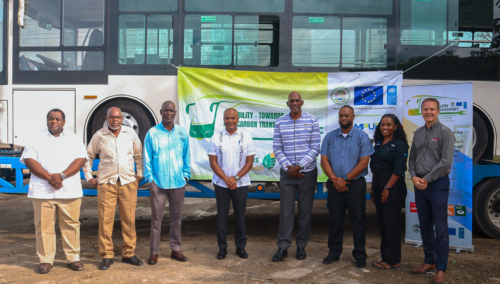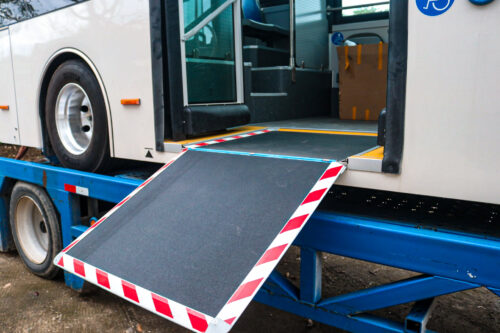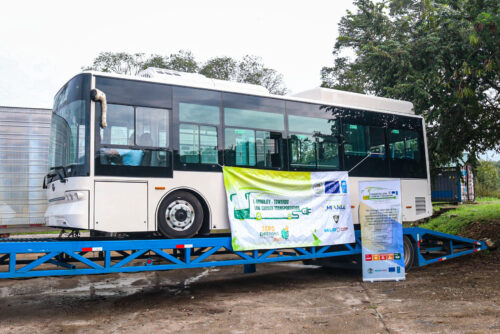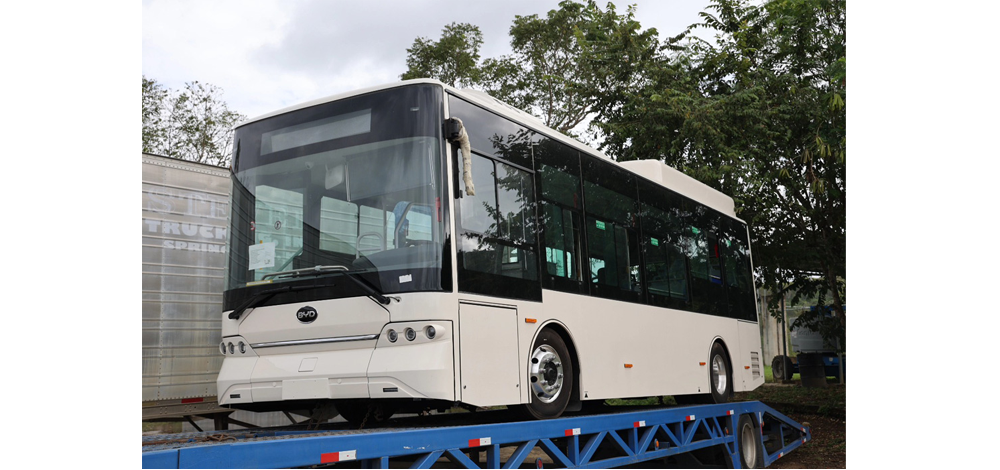BELIZE CITY, Thurs. Feb. 1, 2024
Belize witnessed a milestone in its transportation landscape when the first electric bus arrived at the Belize western border on Monday, January 29, 2024. This event marks a step forward in the Electric Mobility Pilot Project which was officially launched in February 2022, an initiative funded by the European Union (EU) and executed in partnership with the United Nations Development Programme (UNDP), the Belize City Council (BCC), the Ministry of Public Utilities, Energy, Logistics, and E-Governance (MPUELE) and the Department of Transport (DoT).

(Left to Right) CEO Dr. Gilroy Middleton (Ministry of Transport), Hon. Gilroy Usher, Hon. Rodwell Ferguson , Mayor Bernard Wagner, Mr. Ian King (UNDP), Chief Transport Officer, Mr. Leon FitzGerald Gentle (Ministry of Transport), Ms. Taheerah Usher (UNDP) and Chad Dietric (Caribbean Motors)
“The arrival of the first ever electric buses in Belize signifies a transformative era in sustainable transportation, powering the future of mobility. Embracing electric mobility aligns with our energy policy’s commitment and illuminates our path toward an energy-efficient future,” said Hon. Michel Chebat, Minister of Public Utilities, Energy, Logistics & E-Governance.

The Electric Mobility Pilot Project, with an allocated budget of 4.5 million euros (approximately 4.9 million USD), sets the stage for the introduction of e-mobility in Belize. The project’s primary goal is to assess the feasibility and impact of electric buses on the country’s public transport system, with the first bus serving as a cornerstone for the possible expansion of e-mobility.
According to UNDP Deputy Resident Representative, Mr. Ian King, “Through this pilot project, and with the support of the EU and UNDP, Belize is making tangible progress towards the Sustainable Development Goals’ (SDGs) global target of facilitating access to clean energy and promoting mechanisms for climate change by 2030.”
The Belize City Council, under the leadership of Mayor Bernard Wagner, has long been a proactive advocate for smart city enhancements. The arrival of the first two electric buses, assigned to Belize City, signifies a tangible step towards realizing Mayor Wagner’s vision of a more modern and sustainable urban transportation system.
“With the arrival of the bus, Belize City continues stepping toward a more sustainable future. The introduction of these electric buses is more than a pilot project; it’s a testament to our dedication to upgrading lives by responsibly reducing greenhouse gasses and carbon emissions,” said Mayor Wagner.

Key features of the new electric buses include a range of 161 miles with a 206 kWh lithium iron phosphate battery, offering an eight-year warranty. Standard features such as regenerative braking, direct-drive automatic transmission, power steering and electronically regulated air suspension are offered on each bus.
The buses are built to prioritize inclusivity with a motorized wheelchair ramp, catering to elderly and differently-abled passengers. Equipped to accommodate 50 passengers, the buses have non-skid flooring, rustproof poles, passenger handrails, and electronic destination indicators in the front and rear. Modern amenities such as Wi-Fi access and a camera monitoring system will also be a part of the passenger experience.
Ultimately, the project aims to evaluate the viability and sustainability of e-mobility solutions in Belize, contributing to the country’s efforts to reduce carbon emissions and embrace environmentally responsible transportation options.
As the Electric Mobility Pilot Project unfolds, Belize may anticipate a transformative shift towards a low-carbon transport future. Certainly, the implementing project partners, public transportation commuters, current bus operators, environmental enthusiasts and the general public will be eager to review the outcome of this project as the data is collected over the pilot project period.

